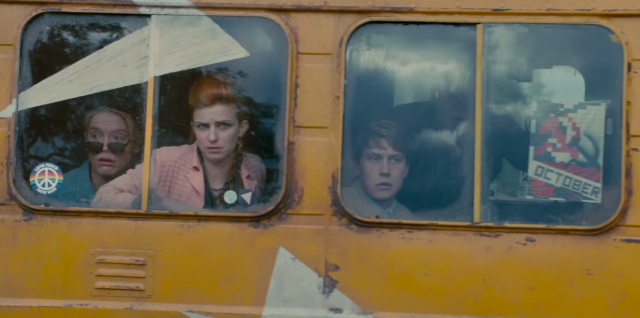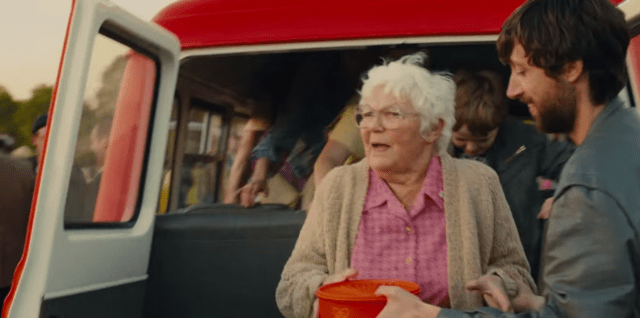Feature image via CBS Films
I went to see Pride knowing relatively little about it — I basically just heard some positive rumblings about “gay,” “true story” and “Bill Nighy” and thought, “Sign me up!” So keep in mind that going into this, I had basically no knowledge of the historical events it covers. I loved it anyway. Here’s the trailer, to get you caught up to my state of mind on Saturday night:
After a brief montage of (real archive) news reports about a miner’s strike and Margaret Thatcher being her unsettlingly cold self, the movie opens on Joe, a young British man celebrating his 20th birthday with his family. They get him a cool camera but make him wear an embarrassing birthday button, because parents. Then Joe sneaks off to London to attend Pride, and you sigh loudly at the thought of sitting through yet another “closeted kid meets activists at Pride, learns the horrors of the world but ultimately comes out stronger” stories. I’ll give you that sigh, because I did it, too, but I’m gonna need you to stick with this movie, because it’s actually so much more than that. It’s my new favorite movie about Pride in the 80s that isn’t about Pride in the 80s.
Rather than focusing purely on pride marches or the AIDS crisis or any of the other very real, important issues the early LGBT rights movement faced, this movie centers on a small group of queer activists (Lesbians and Gays Support the Miners) and their support of a Welsh mining community that’s participating in nationwide strikes against shrinking subsidies. They struggle to find a union that will accept their donations, and once they finally do, it’s only by mistake that they’re accepted. Luckily, it turns out that the town is home to some very welcoming, kind people, and they stand up against those who resist; it’s that struggle that propels us through the two-hour film. And that’s a very clever move, because by focusing on the miner strike storyline — which was a huge national story when it happened — the film creates a more authentic environment in which to tell those other stories of the lesbian and gay diaspora.

Yes, our darling baby Joe learns about reclaiming slurs and standing up to your parents and how fun it is to stay out all night dancing, but the film is equally attentive to the lessons other characters are learning about homophobia, family issues, gay bashing, HIV/AIDS, the commercialization of pride, women’s rights, male femininity and more. We see Sian, a poor Welsh wife and mother surprise herself by becoming an outspoken activist and leader, and in the epilogue we learn she later became a member of Parliament. Jonathan and Gethin, an older gay couple, struggle with contributing to activism despite violence and illness. Mark longs to do something powerful with his life, but is derailed when a former partner is diagnosed with AIDS. Cliff, an aging bachelor whose brother died in the coal mines, grapples with his sister-in-law over her homophobic beliefs. Steph, the disgruntled punk with a heart of gold who serves as “the ‘lesbian’ in ‘Lesbians and Gays Support the Miners’” longs for female companionship but is intimidated by the radical feminist lesbian couple who join LGSM.
Toward the end of the movie, that couple weaves a whole new thread about queer women’s representation when when they break off to form their own group, Lesbians Against Pit Closures. The main characters generally agree it’s sort of unnecessary and/or dumb, but they don’t campaign against the group or try to bring them down. They just keep running their group and interact with LAPC whenever it’s natural, like at the Pride march that ends the movie. It doesn’t feel revisionist, because the movie doesn’t turn it into some huge schism for dramatic effect or delete it entirely because it didn’t provide that drama. It just feels very realistic and true to how activism happens: people in a movement talk and disagree, and then they part ways and do what they each feel is right.

That light-touch technique serves the film so well, it’s hard to even talk about it in a way that doesn’t feel like you’re forgetting something — but not because the story is complicated and overwrought. It feels almost like trying to recount a story about your best friends from college, where it’s always so tempting to give the listener a peek into each of their lives. I learned a great deal about nearly every character in a film where few got their own devoted scenes, and I really appreciated it.
It’s also just a sweet and hilarious movie with a diverse cast of characters (for the setting, at least) that feels comfortably familiar. The ending left me more emotional and triumphant than any movie in recent memory, despite recounting some sad events in the lives of the real people these characters were based on. And whether it actually happened or not, it’s hard not to love the scene where the actress who played the white Lavender Brown in Harry Potter sings “Every woman is a lesbian at heart!” to the tune of “Mine Eyes Have Seen the Glory” with her girlfriend. By the end of the movie, they’ll have you singing, too.
Find out where Pride is playing in your community.





